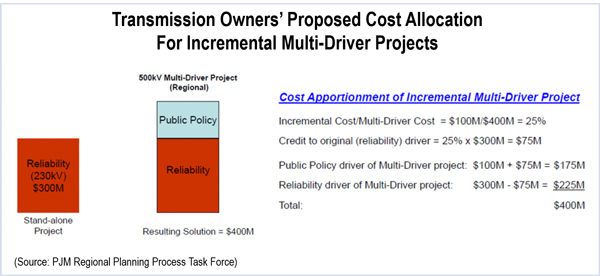By Suzanne Herel
PJM and its Transmission Owners filed a 65-page response Dec. 23 to address what the Federal Energy Regulatory Commission deemed deficiencies in their plan to integrate multi-driver projects into the regional transmission expansion plan (RTEP) (ER14-2864, ER14-2867).
PJM proposed the concept in response to FERC Order 1000, saying it could lower the cost of states’ public policy transmission projects by incorporating them in upgrades that address market efficiency or reliability.
Related revisions to PJM’s Operating Agreement and Tariff were approved by the Members Committee June 26 and filed with FERC Sept. 12, following much debate among stakeholders over what would qualify as such a project and who would pay for it. Some critics worried that the cost allocation scheme would make public policy projects too costly to pursue. (See States Still Miffed with TOs’ ‘Multi-Driver’ Cost.)
FERC’s deficiency notice focused on definitions, process and cost allocation.
Responding to FERC’s question of how such projects will be selected, PJM said, “In essence, there is no separate process for selection of multi-driver projects. … Consistent with Order No. 1000, all projects selected as multi-driver projects will be included in the RTEP for cost allocation purposes because they are found to be the more efficient or cost-effective solution to the PJM region’s needs.”
FERC had also asked PJM and the TOs to show how their cost allocation method satisfied the six regional allocation principles and how it is consistent with determining that participant funding cannot be the regional method.
PJM responded that a multi-driver project will be eligible for regional cost allocation because each component — economic, reliability and public policy — will meet the relevant requirements.
The TOs said that the costs would be allocated “to those who benefit from the facilities in a manner that is at least roughly commensurate with the estimated benefits.”
No new cost allocation method is being proposed for multi-driver projects, the TOs said, with the exception of local transmission projects “boosted” into regional cost allocation due to their combination with a public policy driver. For “boosted projects,” the portion of the project designed for reliability or market efficiency will be allocated 20% pro rata and 80% to those calculated to directly benefit, rather than 50-50.
“Even though the allocation to the reliability or market efficiency portion has changed by having 20% of those portions allocated pro rata, those who would not have received a cost allocation but for the ‘boosting’ of the project to a regional facility, still receive a benefit because of the greater capacity of the regional facility,” the TOs said.
Cost allocation would continue to be assigned by two methods: incremental and proportional.
The incremental method would be used when the project was developed to address a single driver, but modified to satisfy other goals and becomes more cost-effective for all drivers. The initial driver would have its cost share reduced by “an amount equal to the ratio of the estimated incremental cost of the new driver(s) to the estimated new total cost of the project multiplied by the estimated cost of the original driver.”
The proportional method would apply when a project was developed parallel to individual solutions to different drivers and then combined. In that case, cost would be allocated relative to what would have been required to address each driver separately.
Annual Cost Allocation Update Filed
In a related matter, PJM on Dec. 30 submitted its updated annual cost allocation for regional facilities and “necessary” lower-voltage facilities included in the RTEP (ER15-758).



